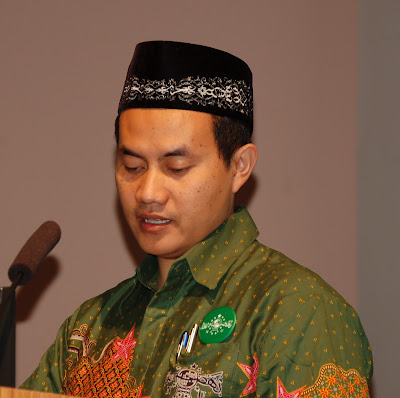For the presentation of Islam Nusantara there was a group of some 14 former stewardesses of Garuda Airlines. They had come especially for this three-day event from Jakarta. Above, in red is their presentation at the conference of 27 March at the Free University. Below the colourful dress worn at the closing dinner of 29th. All hymns and lyrics sung by heart with modest dancing.
The ladies in black above are a group of salawat-singers of NU circles in the Netherlands. The youngsters below performed a very dynamic way of pious local dances. Great entertainment, between the numerous speeches as part of a good Indonesian festive event.
I had written a poem to celebrate Islam nusantara and could read it here as well.
Sifat
duapuluh seorang Muslim Nusantara atau
Kebanggaan Ganda
Tentu
saja dia bisa berenang
antara
sini dan sana, datang dan pulang
dia tetap dalam air merasa senang
dari pulau ke pulau Tuhanlah dia memandang
Baginya samudra adalah Tuhannya
pulau-pulau hanya stasiun atau maqamnya
Hamzah Fansuri nakhodanya
Sunan Giri tetap gurunya
Baginya Belanda tidak lagi musuh
banyak cari negara ini sebagai tempat teduh
restorannya menyediakan nasi lezat, piring penuh
tanah
Arab dianggapnya kering dan keruh
Mukhalaf
lil hawadith, berbeda dari yang baru
dia
juga tidak takut kemodernan, tak terharu
hal
yang baru tidak jadi dia menyeru
malah
penyesuaian, pembaharuan itu perlu!
Ahmad Baso adalah laksmana pikiran
dialah yang memimpin pasukan
memberikan ceramah berapi, nulis laporan
Habib dan ustaz takut dia punya ajakan.
NU tidak hanya makna Nahdat al-'ulama
tetapi juga bangkit semangat Nusantara
tidak perlu lagi fatwa jihad lawan Belanda
Tebuireng, waratsatul Majapahit, menjadi tanda
kebanggaan ganda.
Karel
Steenbrink, Den Haag 29 Maret 2017














